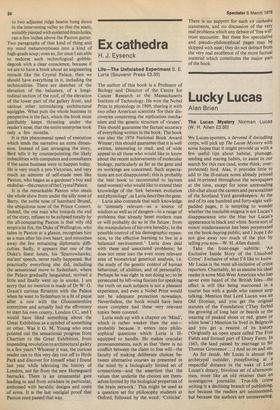Lucky Lucas
Alan Brien
The Lucan Mystery Norman Lucas (W. H. Allen E3.50)
We Lucan-spotters, a devoted if dwindling corps, will pick up The Lucan Mystery with some hopes that it might provide us with a few useful tips about habitat, plumage, seeding and mating habits, to assist in our search for this rare (and, some think, overprotected) bird. Alas, it provides little to add to the ill-nature notes already printed and re-printed throughout the newspapers at the time, except for some unrevealing chit-chat about the careers and personalities of the Scotland Yard gamekeepers. At the end of its one hundred and forty-eight wellpadded pages, it is tempting to wonder whether the insoluble enigma is not Lucan's disappearance into the blue but Lucas's appearance in black and white. Some sort of minor misdemeanour has been perpetrated on the book-buying public, and I hope I do not give away too much of the plot by telling you now—W. H. Allen dunnit.
Take the front-page subtitle: 'An Exclusive Inside Story of the Unsolved Crime'. Exclusive of what I'd like to know. Mr Lucas is the most all-inclusive of crime reporters. Charitably, let us assume his ideal reader is some Mid-West American who has never even heard of the British Isles—the effect is still like being marooned in a tourist bus with a guide who cannot stop talking. Mention that Lord Lucan was an Old Etonian, and you get the original statutes of the Foundation (`They forbid the growing of long hair or beards or the wearing of peaked shoes or red, green or white hose'.) Mention he lived in Belgravia and you get a resume of its history ('Originally an open space called The Five Fields and formed part of Ebury Farm, In 1663, the land passed by marriage to Sir Thomas Grosvenor. ...) And so on and on.
As for Inside, Mr Lucas is almost the archetypal outsider, pussyfooting at a respectful distance in the wake of Lord Lucan's dreary, frivolous set of afternoon
men, more like an old retainer than an investigative journalist. True-life crime writing is a declining branch of publishing, not because the readers are uninterested, but because the authors are uninteresting.


































 Previous page
Previous page